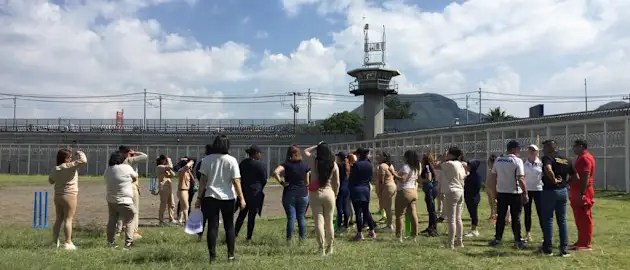Cricket in Prisons project transforming lives of prisoners in Mexico City
The Mexico Cricket Association (MCA) hopes to remind the nation of the power of sport after witnessing the benefits cricket can bring to the lives and attitudes of prisoners.

Since introducing the Cricket in Prisons project in partnership with the National Commission of Physical Culture and Sport (CONADE) to promote values of teamwork and respect, the outcome has defied expectations.
Cricket in Prisons has catapulted participation of what remains a niche sport in Mexico, as hundreds of male and female prisoners now train weekly, with several saying the sport has become a form of therapy.
The first of its kind programme tailors the rules and scoring of the traditional format to fit with the inmates’ daily routine, but the ultimate goal is to ease prisoners’ reintegration into society after their release.
With plans to expand the initiative to national level, the Mexico Cricket Association is sponsoring a country-wide prison competition for the most entertaining exercise routine to encourage even more to take up the bat.
The forward-thinking, community driven nature of the project has even been recognised at the ICC Development Awards, with MCA winning the Development Initiative of the Year prize.
ICC Development Initiative of the Year - Mexico
ICC Development Initiative of the Year - Mexico
Eduardo Acevedo, the brains behind the project and chief of department for CONADE, hopes this is just the beginning.
Acevedo said: “Cricket is teaching prisoners how to relate to each other, be respectful and disciplined, as well as allowing them to exercise. It’s not like other sports which provoke rivalry and violence.
“We know life in prison is very hard. It’s lonely and prisoners can be inside for a long time, so anything that makes their lives a little bit happier or a little bit easier, such as cricket, is absolutely worth doing.”
As the popularity of the sport continues to grow and the benefits to prisoners become increasingly clear, Acevedo wants to see the programme expand across the country.
“Currently we have cricket in four prisons in Mexico City at the local level, but we have seen how it can be life-changing for prisoners. It is supporting their reintegration into society in so many ways,” he added.
“We are seeing more women start playing, which is encouraging their children to do the same.
“Being trained in a new and little known sport can allow these women to teach their communities once they are released which will not only give them a source of income but contribute to the growth of the sport too.
“In one prison, we have seen prisoners start to make their own bats and balls so that they can play when CONADE officials are not there to host training.
“To get prison inmates to start manufacturing bats in carpentry lessons is another goal of ours which will help teach valuable skills.”
Cricket is now considered a ‘special activity’ within the Mexican government and it is hoped its introduction into high-security prisons will have a waterfall effect.
“There is a lot of potential still but the key stumbling block is a lack of plastic equipment,” Acevedo said.
“I would love to see cricket become a central sport of the federal penitentiary system in all 32 states in Mexico.
“If cricket becomes a central activity ordered by the government it will really take off. That’s what we’re really hoping will be the next step.”
